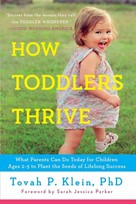The Emotional Ups and Downs of Toddlers
By Dr. Tovah P. Klein, Ph.D.

The toddler years are trying and tender - they come with unmatched joys and challenges. Often referred to as the ‘Terrible Twos’, tantrums can become commonplace, and learning how to handle them is something of a rite of passage for new parents.
This developmental stage is foundational to who your child will become. Understanding what underlies the tumult of this period can make life easier for you and allow you to focus more on the joys and pleasures of raising your little one.
The newness of your toddler’s brain drives the upheavals of this time - it will take another 20 years or more to reach full brain development. Toddlers are figuring out how to be separate from their parents and are gaining a sense of self, but they also don’t want to be alone in the world. The fierce push-pull of needing to know mummy or daddy is close, coupled with powerful desires to explore on their own, spurs on meltdowns. “I want to do it myself” conflicts with “I need you!”
The new emotions that arise, including anger and frustration, coupled with the brain’s lagging capabilities to control them, complicate this process. Toddlers become increasingly emotion-flooded. They are not being bad. Your child is overwhelmed and in need of support.
Tantrums need not be avoided. They are learning moments that happen when a child is flooded and lacking the language needed to communicate or handle the hard feelings. Meltdown! Do all you can to not take it personally. Toddlers need responsible adults to stay calm when they are upset. They feel your emotions and loving presence.
Empathy and recognition go a long way - everyone wants to be understood, even when desires cannot be indulged. Labeling their desires helps them manage limits. This is how we begin to help children handle disappointment (a part of life forever!) Instead of saying, “How many times have I told you no cookies before dinner?” Try empathy: “I know how much you love cookies. I am going to put them on the counter for after,” or, “You really wanted to play more at the playground. I wish we could stay longer. You can be mad about leaving!” Toddlers live in the moment - their desire right now is the only one they know. A key parent role is to recognise the moment matters in a big way to them. Help them feel understood by stating their desire and eventually they will be able to move on.
Seeing your toddler as new to the world, and remembering that they are figuring out life with experimentation and exploration, will allow you to take a step back. Give them room to be on their own, with you close by. Watch them explore. Wonder together about what they see, hear and discover. Allow them to try for themselves - and yes, to stumble. Comfort as needed, but let them do it. And go light on yourself – there is no such thing as a perfect parent, nor should you strive for that. Instead, keep your humour, stay light in response to tough situations, and enjoy these truly magical years.
----------------------------
Dr. Tovah P. Klein, dubbed "the toddler whisperer" by US TV's Good Morning America, is an Associate Professor of Psychology and Director of the Barnard College Centre for Toddler Development. Her new book How Toddlers Thrive: What parents can do today for children ages 2 to 5 to plant the seeds of lifelong success is available to buy now.
